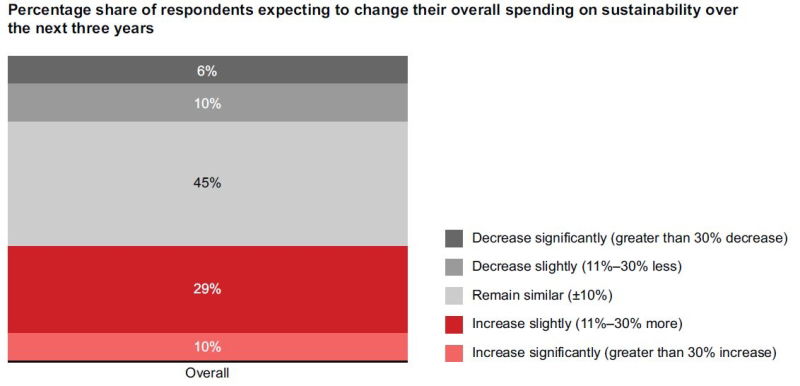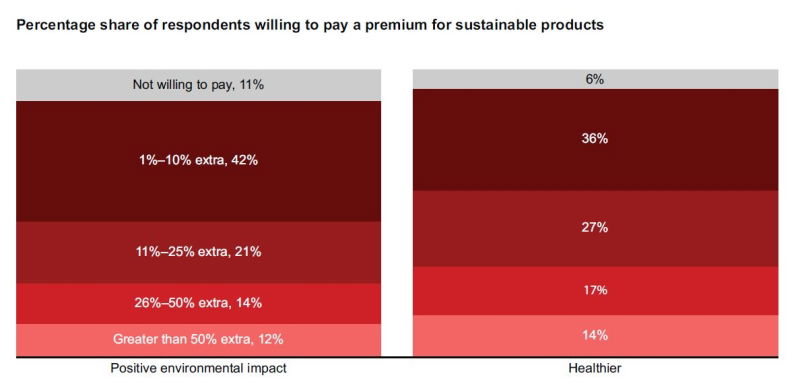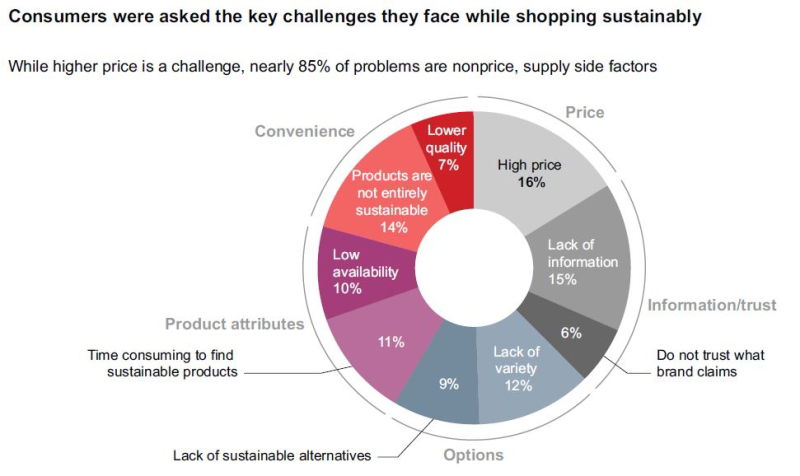
Study: APAC customers have a 'say-do' gap problem
share on
APAC consumers care more about sustainability nowadays and are willing to spend more, but their actions fall short. According to a Bain & Company study, developing Asia Pacific markets have a greater "say-do" gap, which means that the percentage of customers claiming to buy sustainable products is bigger than that of those buying such products.
The report said that among consumers in China, 54% ranked sustainability as one of the top-five key purchasing criteria, yet sustainable products comprised only 12% of the market share in packaged foods. In Vietnam, the gap is 41% to 3%. On the contrary, in mature markets such as Singapore, the gap was only 23% to 14%.
However, these consumers who were not buying sustainable products also had an ambition for spending more on such goods in the future.
According to the survey, nearly 40% of consumers said they had planned to increase their spending on sustainable products over the next three years. For brands, there is a mounting opportunity to use sustainable products as a new source of growth, although they need to know how to narrow the "say-do" gap.
 Moreover, 90% of consumers said they were willing to pay for positive environmental impact and health.
Moreover, 90% of consumers said they were willing to pay for positive environmental impact and health.

Customers in the region also received information about sustainability from no fewer than three sources. As a result, consumers have a nascent understanding of sustainability. In addition to the lack of information, other common challenges to shopping sustainably included a distrust of brand claims, a lack of variety in products, and gaps in availability. Although 16% of customers cited high price as a reason for not shopping sustainably, convenience, information and trust, as well as product attributes were other major reasons for preventing them from buying sustainable products.
Despite the shift to sustainable purchasing still being in its early stage, the report suggested that brands can take four steps to the hearts of Asia Pacific’s sustainable consumers.
First, brands need to respond quickly and set an ambition that goes beyond the easy to reach, and they will avoid vague commitments. Instead, brands need to equip their teams all the way to the front line to take action, providing the requisite funding, skills, and technology.
They need to measure, track, and count to keep on top of progress, revising operations as needed in real time. Social media–enabled super promoters are defined as a consumer who recommend to more than 10 people, and they actively recommended sustainable products they like. This can work to a brand's benefit. 
Moreover, brands need to work on ESG topics that they want to engage consumers on. For example, Danone embedded sustainability into its business strategy and its brands. It also plans to triple its plant-based business by 2025, and 70% of its entities are transitioning to regenerative agriculture. As part of its commitment to improving health, the company’s SGM infant formula brand in Indonesia is helping to tackle nutritional deficiencies in that country, where 37% of children under five years old suffer from stunted growth.
Brands are also advised to define or quantify the benefits of embedding sustainability into their products and business. Sustainability offers opportunities to grow market share, build partnerships with retailers, or capture a price premium, while it can also make products cheaper and easier to manufacture, by reducing or eliminating plastic packaging. Without clarity on the business case, brands risk an unfocused agenda, missed expectations, and a de-motivated organisation that feels as though sustainability initiatives are a tax rather than an opportunity to grow and succeed.
Lastly, brands need to design and deliver a holistic pathway to action that contains all investments, organisational changes, and marketing approaches required to make an impact. They also need to start measuring that impact using not only traditional metrics but also new ESG metrics that are aligned with the company’s overall ESG strategy.
Related articles
Booking.com celebrates sustainability with light installation and plant-based menu
Study: Consumers just aren't buying your sustainability claims
Earth Day round up 2022: Brands walk the talk for sustainability
share on
Free newsletter
Get the daily lowdown on Asia's top marketing stories.
We break down the big and messy topics of the day so you're updated on the most important developments in Asia's marketing development – for free.
subscribe now open in new window
